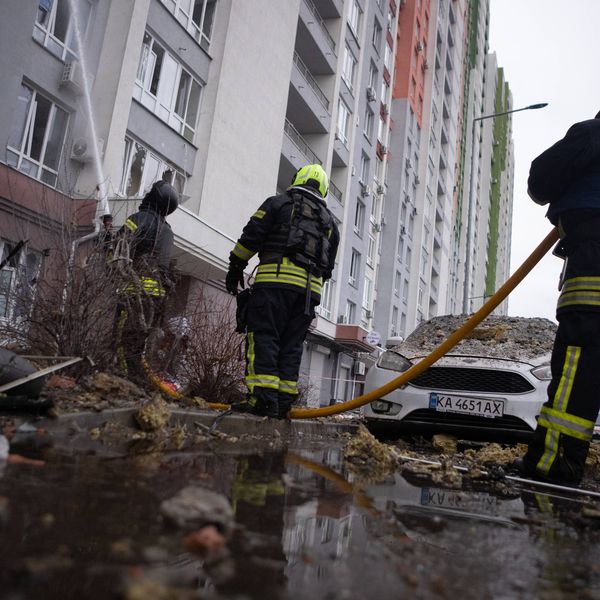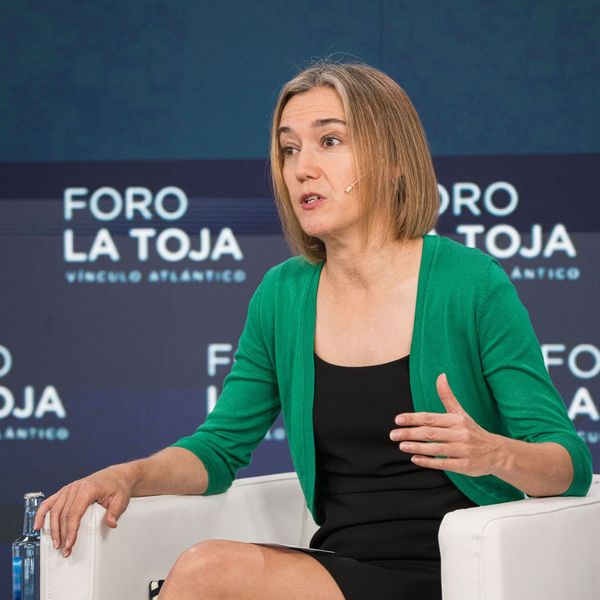US/Russia Diplomatic Talks on Ukraine Fall Flat as Referendum Vote Looms
Kerry threatens "consequences if Russia does not find a way to change course."
Unsuccessful talks between Russia and the U.S., increased Russian troop presence, and a pending referendum vote bring continued uncertainties and tensions as the crisis in Ukraine continues to unfold.
On Friday, U.S. Secretary of State John Kerry and Russian Foreign Minister Sergei Lavrov held a nearly six-hour meeting in London, which was said to come to no diplomatic resolution.
Lavrov said the talks were "useful" yet brought about "no common vision" between the two countries.
Kerry told reporters that "there will be consequences if Russia does not find a way to change course."
The Guardian reported that the meeting's failure brought the crisis to "a new and more dangerous phase" and "sets Russia on a collision course with the west."
Kerry said that "the foreign minister made it clear that President Putin is not prepared to make any decision regarding Ukraine until after the referendum on Sunday." In that referendum, CNN reported,
residents of the Crimean Peninsula will vote whether to secede from Ukraine and join Russia or to choose effective independence.
Kerry said, "Neither we nor the international community will recognize the results of this referendum."
"We believe the referendum is contrary to the constitution of Ukraine, contrary to international law, is in violation of that law, and is illegitimate." he said. Lavrov, meanwhile, told reporters, "We will respect the will of people of Crimea that will be expressed at the referendum on the 16th of March."
Kerry has warned that if the vote takes place, Russia faces EU and U.S. sanctions.
"I assure you that our partners understand that sanctions are counterproductive ... and (they) will not facilitate mutual interests," Lavrov said.
Russia was increasing its troop presence, "mass[ing] troops and armored vehicles in at least three regions along Ukraine's eastern border on Thursday, alarming the interim Ukraine government about a possible invasion and significantly escalating tensions in the crisis between the Kremlin and the West," the New York Times reported.
Reporting by Reuters adds:
A Russian warship unloaded trucks, troops and at least one armoured personnel carrier at a bay near Sevastopol in Crimea on Friday morning, as Moscow continued to build up its forces on the Ukrainian peninsula. [...]
Ukrainian officials and analysts estimate that some 20,000 Russian troops are in Crimea, of whom fewer than 12,000 are attached to the Black Sea Fleet, with the remainder comprising infantry and paratroopers brought from Russia. Under the terms of the lease for the fleet, Moscow can station up to 25,000 troops in Sevastopol, but not on other Ukrainian territory.
White House spokesman Jay Carney said Friday, "We have obviously not gotten to a situation where Russia has chosen to de-escalate, where Russia has chosen a path of resolving the situation peacefully and through diplomacy. That is regrettable. We will have to see how the next several days unfold."
___________________
An Urgent Message From Our Co-Founder
Dear Common Dreams reader, The U.S. is on a fast track to authoritarianism like nothing I've ever seen. Meanwhile, corporate news outlets are utterly capitulating to Trump, twisting their coverage to avoid drawing his ire while lining up to stuff cash in his pockets. That's why I believe that Common Dreams is doing the best and most consequential reporting that we've ever done. Our small but mighty team is a progressive reporting powerhouse, covering the news every day that the corporate media never will. Our mission has always been simple: To inform. To inspire. And to ignite change for the common good. Now here's the key piece that I want all our readers to understand: None of this would be possible without your financial support. That's not just some fundraising cliche. It's the absolute and literal truth. We don't accept corporate advertising and never will. We don't have a paywall because we don't think people should be blocked from critical news based on their ability to pay. Everything we do is funded by the donations of readers like you. Will you donate now to help power the nonprofit, independent reporting of Common Dreams? Thank you for being a vital member of our community. Together, we can keep independent journalism alive when it’s needed most. - Craig Brown, Co-founder |
Unsuccessful talks between Russia and the U.S., increased Russian troop presence, and a pending referendum vote bring continued uncertainties and tensions as the crisis in Ukraine continues to unfold.
On Friday, U.S. Secretary of State John Kerry and Russian Foreign Minister Sergei Lavrov held a nearly six-hour meeting in London, which was said to come to no diplomatic resolution.
Lavrov said the talks were "useful" yet brought about "no common vision" between the two countries.
Kerry told reporters that "there will be consequences if Russia does not find a way to change course."
The Guardian reported that the meeting's failure brought the crisis to "a new and more dangerous phase" and "sets Russia on a collision course with the west."
Kerry said that "the foreign minister made it clear that President Putin is not prepared to make any decision regarding Ukraine until after the referendum on Sunday." In that referendum, CNN reported,
residents of the Crimean Peninsula will vote whether to secede from Ukraine and join Russia or to choose effective independence.
Kerry said, "Neither we nor the international community will recognize the results of this referendum."
"We believe the referendum is contrary to the constitution of Ukraine, contrary to international law, is in violation of that law, and is illegitimate." he said. Lavrov, meanwhile, told reporters, "We will respect the will of people of Crimea that will be expressed at the referendum on the 16th of March."
Kerry has warned that if the vote takes place, Russia faces EU and U.S. sanctions.
"I assure you that our partners understand that sanctions are counterproductive ... and (they) will not facilitate mutual interests," Lavrov said.
Russia was increasing its troop presence, "mass[ing] troops and armored vehicles in at least three regions along Ukraine's eastern border on Thursday, alarming the interim Ukraine government about a possible invasion and significantly escalating tensions in the crisis between the Kremlin and the West," the New York Times reported.
Reporting by Reuters adds:
A Russian warship unloaded trucks, troops and at least one armoured personnel carrier at a bay near Sevastopol in Crimea on Friday morning, as Moscow continued to build up its forces on the Ukrainian peninsula. [...]
Ukrainian officials and analysts estimate that some 20,000 Russian troops are in Crimea, of whom fewer than 12,000 are attached to the Black Sea Fleet, with the remainder comprising infantry and paratroopers brought from Russia. Under the terms of the lease for the fleet, Moscow can station up to 25,000 troops in Sevastopol, but not on other Ukrainian territory.
White House spokesman Jay Carney said Friday, "We have obviously not gotten to a situation where Russia has chosen to de-escalate, where Russia has chosen a path of resolving the situation peacefully and through diplomacy. That is regrettable. We will have to see how the next several days unfold."
___________________
Unsuccessful talks between Russia and the U.S., increased Russian troop presence, and a pending referendum vote bring continued uncertainties and tensions as the crisis in Ukraine continues to unfold.
On Friday, U.S. Secretary of State John Kerry and Russian Foreign Minister Sergei Lavrov held a nearly six-hour meeting in London, which was said to come to no diplomatic resolution.
Lavrov said the talks were "useful" yet brought about "no common vision" between the two countries.
Kerry told reporters that "there will be consequences if Russia does not find a way to change course."
The Guardian reported that the meeting's failure brought the crisis to "a new and more dangerous phase" and "sets Russia on a collision course with the west."
Kerry said that "the foreign minister made it clear that President Putin is not prepared to make any decision regarding Ukraine until after the referendum on Sunday." In that referendum, CNN reported,
residents of the Crimean Peninsula will vote whether to secede from Ukraine and join Russia or to choose effective independence.
Kerry said, "Neither we nor the international community will recognize the results of this referendum."
"We believe the referendum is contrary to the constitution of Ukraine, contrary to international law, is in violation of that law, and is illegitimate." he said. Lavrov, meanwhile, told reporters, "We will respect the will of people of Crimea that will be expressed at the referendum on the 16th of March."
Kerry has warned that if the vote takes place, Russia faces EU and U.S. sanctions.
"I assure you that our partners understand that sanctions are counterproductive ... and (they) will not facilitate mutual interests," Lavrov said.
Russia was increasing its troop presence, "mass[ing] troops and armored vehicles in at least three regions along Ukraine's eastern border on Thursday, alarming the interim Ukraine government about a possible invasion and significantly escalating tensions in the crisis between the Kremlin and the West," the New York Times reported.
Reporting by Reuters adds:
A Russian warship unloaded trucks, troops and at least one armoured personnel carrier at a bay near Sevastopol in Crimea on Friday morning, as Moscow continued to build up its forces on the Ukrainian peninsula. [...]
Ukrainian officials and analysts estimate that some 20,000 Russian troops are in Crimea, of whom fewer than 12,000 are attached to the Black Sea Fleet, with the remainder comprising infantry and paratroopers brought from Russia. Under the terms of the lease for the fleet, Moscow can station up to 25,000 troops in Sevastopol, but not on other Ukrainian territory.
White House spokesman Jay Carney said Friday, "We have obviously not gotten to a situation where Russia has chosen to de-escalate, where Russia has chosen a path of resolving the situation peacefully and through diplomacy. That is regrettable. We will have to see how the next several days unfold."
___________________

